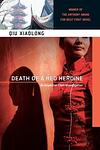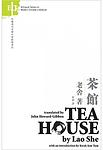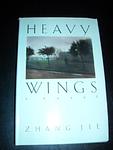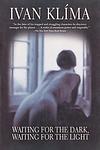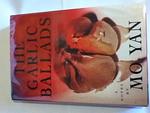The Greatest Czech, Chinese "Fiction" Books Since 1950
Click to learn how this list is calculated.
This list represents a comprehensive and trusted collection of the greatest books. Developed through a specialized algorithm, it brings together 300 'best of' book lists to form a definitive guide to the world's most acclaimed books. For those interested in how these books are chosen, additional details can be found on the rankings page.
Genres
Countries
Date Range
Reading Statistics
Click the button below to see how many of these books you've read!
Download
If you're interested in downloading this list as a CSV file for use in a spreadsheet application, you can easily do so by clicking the button below. Please note that to ensure a manageable file size and faster download, the CSV will include details for only the first 500 books.
Download-
1. The Unbearable Lightness of Being by Milan Kundera
Set against the backdrop of the Prague Spring period of Czechoslovak history, the novel explores the philosophical concept of Nietzsche's eternal return through the intertwined lives of four characters: a womanizing surgeon, his intellectual wife, his naïve mistress, and her stoic lover. The narrative delves into their personal struggles with lightness and heaviness, freedom and fate, love and betrayal, and the complexities of human relationships, all while offering a profound meditation on the nature of existence and the paradoxes of life.
-
2. Franz Kafka: The Complete Stories by Franz Kafka
This collection of stories offers a comprehensive look at the work of a renowned author, known for his surreal and often unsettling depictions of modern life. The stories explore themes of existential anxiety, guilt, and absurdity, often through narratives in which ordinary people face extraordinary, inexplicable circumstances. The collection showcases the author's unique style and his profound influence on 20th-century literature.
-
3. The Book of Laughter and Forgetting by Milan Kundera
This novel is a blend of fiction, autobiography, and philosophical musings that explores the nature of forgetting, the power of laughter, and the struggle for personal and political freedom. Set against the backdrop of the political turmoil in Czechoslovakia in the 20th century, it follows the interconnected stories of various characters, including a man who is expelled from the Communist Party, a young woman in love with a man whose father was a political prisoner, and a couple who flee to America. Throughout, the book delves into the ways in which personal and collective memories shape identity and history.
-
4. The Joke by Milan Kundera
"The Joke" follows the life of Ludvik Jahn, a man expelled from the Czechoslovak Communist Party, his university, and the army for a harmless joke he sends in a postcard to a girlfriend. The narrative explores his life before, during, and after his punishment, and his attempts to exact revenge on those who wronged him. Set against the backdrop of the Prague Spring and the Soviet Invasion, the novel delves into the themes of political satire, the absurdity of totalitarianism, and the individual's struggle against an impersonal and oppressive system.
-
5. Waiting by Ha Jin
"Waiting" is a story set in China during the Cultural Revolution and its aftermath, revolving around the life of Lin Kong, a military doctor who is torn between his love for two women. He is stuck in an arranged marriage with his traditional wife in the countryside, while he falls in love with a modern, city nurse. The novel explores his 18-year struggle to divorce his wife and marry his lover, depicting the clash between traditional and modern Chinese culture, personal desires, and societal expectations.
-
6. Closely Watched Trains by Bohumil Hrabal
"Closely Watched Trains" is a darkly humorous tale set in Nazi-occupied Czechoslovakia during World War II. It follows the life of a young, inexperienced railway worker who is struggling with his sexual awakening while dealing with the harsh realities of war. The novel is a poignant exploration of the absurdity of life, the tragicomedy of human existence, and the power of ordinary people to resist oppression.
-
7. I Served The King Of England by Bohumil Hrabal
"I Served The King Of England" is a captivating novel that follows the life of a young Czech waiter named Ditie, who dreams of becoming a millionaire and serving the highest-ranking clientele. Set against the backdrop of World War II and the Communist regime, the story takes readers on a journey through Ditie's experiences in various hotels and restaurants, his encounters with eccentric characters, and his pursuit of love and success. With humor, wit, and a touch of satire, the book explores themes of ambition, identity, and the impact of historical events on an individual's life.
-
8. Balzac and the Little Chinese Seamstress by Dai Sijie
This novel tells the story of two teenage boys sent to a remote mountain village for re-education during China's Cultural Revolution. There, they meet a local tailor's daughter, who becomes their friend and the object of their shared affection. The boys discover a hidden suitcase filled with forbidden Western classics in Chinese translation, and their lives are forever changed. The books not only awaken their passion for literature, but also allow them to educate the Seamstress, ultimately leading to a heartbreaking love triangle and a tale of personal freedom against the odds.
-
9. The Three-Body Problem by Cixin Liu
The book is a science fiction novel that intertwines the cultural revolution of China with a complex narrative involving astrophysics, virtual reality, and alien contact. It follows a disillusioned scientist who, after suffering personal tragedy during the Cultural Revolution, sends a message into space, only to receive a response from an alien civilization on the brink of destruction. As the aliens plan their migration to Earth, a secret organization works to facilitate the invasion, while a disparate group of scientists and military personnel attempt to understand and prevent the impending extraterrestrial crisis. The novel grapples with themes of human nature, technological advancement, and the vast, often incomprehensible universe.
-
10. The Engineer of Human Souls by Josef Škvorecký
The novel is a semi-autobiographical narrative of a Czechoslovakian writer who has become a professor at a Canadian university, teaching American literature. The narrative switches between his current life in Canada and his memories of the past in Czechoslovakia, including the Nazi occupation and the Communist regime. The book presents a complex portrayal of the life of an intellectual in exile and the challenges of cultural assimilation, while also exploring themes of love, politics, and the power of literature.
-
11. Death Of A Red Heroine by Qiu Xiaolong
"Death Of A Red Heroine" is a crime novel set in 1990s Shanghai, China. The story follows Inspector Chen Cao as he investigates the murder of a young woman, whose body is found in a canal. As Chen delves deeper into the case, he uncovers a web of corruption, political intrigue, and personal secrets that challenge his loyalty to the Communist Party and force him to confront the complexities of modern Chinese society. Through vivid descriptions of Shanghai's changing landscape and insightful commentary on social issues, the novel offers a captivating portrayal of a country in transition.
-
12. A Hero Born by Jin Yong
"A Hero Born" is the first installment in an epic martial arts saga set in the Song Dynasty of China, where the story follows the life of Guo Jing, a young boy from a humble background. After his father, a loyal Song patriot, is murdered, Guo Jing is raised by Genghis Khan in the Mongolian steppes. Throughout his adventures, he encounters a diverse cast of characters, learns from legendary martial arts masters, and is imbued with the values of honor, loyalty, and the complex moralities of warfare and brotherhood. His destiny is intertwined with the fate of his nation as he embarks on a quest to become a true hero and to confront formidable enemies that threaten the very fabric of the martial arts world.
-
13. Teahouse by Lao She
"Teahouse" is a historical drama that explores 50 years of Chinese history (1898-1948) through the microcosm of a Beijing teahouse. The narrative follows the lives of the teahouse owner and his customers, reflecting the social changes, political turmoil, and cultural shifts of the time. The story provides a deep insight into the Chinese society, its traditions, and the impact of Western influence. It also highlights the struggle of the common people amidst corruption, oppression, and the collapse of traditional values.
-
14. Heavy Wings by Zhang Jie
"Heavy Wings" is a novel that explores the societal changes in China during the late 20th century. It follows the story of a group of innovative engineers striving to design and build China's first large-scale commercial aircraft. Despite facing numerous challenges such as lack of resources, political interference, and personal struggles, they remain committed to their mission, symbolizing the spirit of perseverance and innovation. The story is a reflection of China's journey towards modernization and technological advancement.
-
15. Too Loud A Solitude by Bohumil Hrabal
The narrative centers around an elderly man who has spent his life compacting paper and books into bales in a decrepit cellar, using a hydraulic press. Despite the menial nature of his job, he has cultivated a deep love and profound knowledge for literature, philosophy, and art from the books that pass through his hands, many of which he rescues from destruction. The story is a poignant exploration of the power and resilience of the human spirit in the face of a dehumanizing, totalitarian regime, and a meditation on the enduring value of art and the written word. The protagonist's intellectual journey and his resistance to the oppressive forces around him serve as a metaphor for the survival of culture and individuality under oppressive conditions.
-
16. Cutting It Short by Bohumil Hrabal
Set in a small Czech town during the 1920s, the narrative follows the life of a vivacious and free-spirited young woman married to the town's brewery manager. Her playful and unconventional behavior often leads to humorous and sometimes scandalous situations, as she navigates through the social norms and expectations of the time. The story captures the charm and eccentricities of rural life through a series of anecdotes, reflecting on the themes of freedom, tradition, and the joy of the everyday. The protagonist's zest for life and her interactions with the colorful cast of characters create a whimsical and endearing portrait of a community on the brink of modernization.
-
17. Half of Man is Woman by Zhang Xianliang
This novel provides a deeply personal account of the author's experiences during China's Cultural Revolution and his subsequent imprisonment in a labor camp. The protagonist struggles with the harsh realities of his imprisonment, including starvation and physical abuse, while also grappling with his own identity and the societal expectations of masculinity. His release and subsequent marriage only further complicate his quest for self-understanding, as he navigates the challenges of reintegrating into society and maintaining a relationship with a woman who has her own traumatic past.
-
18. My City: A Hong Kong Story by Xi Xi
"My City: A Hong Kong Story" is a compelling narrative that provides an intimate exploration of Hong Kong through the author's eyes. The author weaves a rich tapestry of the city's unique culture, history, and identity, drawing on personal experiences, observations, and a deep love for the city. The book is a poignant tribute to Hong Kong, presenting the city's transformation over the years and the challenges it faces, while also highlighting its resilience and spirit.
-
19. Waiting for the Dark, Waiting for the Light by Ivan Klíma
The novel is set in the twilight of Communist rule in Czechoslovakia and follows the life of a television cameraman named Pavel. Despite his dreams of becoming a filmmaker and capturing the truth, he is trapped in a job that requires him to distort it. As the regime starts to crumble, Pavel grapples with the opportunities and challenges that freedom brings. He is forced to confront his past, his moral choices, and his dreams, leading to a deep exploration of the human condition and the struggle for personal and artistic freedom.
-
20. City, Sister, Silver by Jáchym Topol
This novel follows the journey of a young Czech man, Potok, as he navigates the tumultuous period of the Velvet Revolution and its aftermath. The story is filled with surreal and often disturbing imagery as it explores themes of chaos, transformation, and the struggle for identity in a rapidly changing world. Potok's adventures take him from the crumbling infrastructure of post-communist Czechoslovakia to the burgeoning world of Western Europe, and his experiences reflect the larger societal upheaval of the time.
-
21. Love Must Not Be Forgotten by Zhang Jie
The narrative explores the complexities of love and memory through the lens of a woman who discovers her deceased mother's diary, which reveals a poignant and secret love affair. As the daughter delves into the pages, she confronts her own romantic dilemmas and the societal pressures of 1980s China. The story weaves together themes of personal freedom, the weight of traditional expectations, and the enduring impact of love across generations, prompting the protagonist to reflect on her life choices and the possibility of happiness in her future relationships.
-
22. Spring Moon by Betty Bao Lord
Set against the backdrop of a changing China from the late Qing Dynasty through the Cultural Revolution, the novel follows the life of Spring Moon, a young noblewoman of the Soong family. As she navigates the complexities of tradition and modernity, Spring Moon experiences personal tragedies and triumphs while witnessing the seismic shifts in Chinese society. Her story is one of love, loss, and resilience, reflecting the broader historical forces at play that reshape her country and her family's destiny. Through her eyes, readers experience the clash of old values with new ways, and the struggle to find harmony amidst chaos.
-
23. Dita Saxova by Arnost Lustig
The novel is a poignant exploration of the life of a young Holocaust survivor grappling with the traumas of her past while trying to navigate the complexities of her new life. The protagonist, a teenage girl, finds herself living with her aunt in post-war Prague after enduring the horrors of a Nazi concentration camp. The narrative delves into her struggles with identity, memory, and the challenge of moving forward when the shadows of loss and guilt loom large. Through her journey, the book examines themes of survival, the search for meaning, and the resilience of the human spirit in the aftermath of atrocity.
-
24. The Garlic Ballads: A Novel by Yan Mo
The novel is a harsh critique of the Chinese government's agricultural policy. Set in 1980s China, it tells the story of the farmers of Paradise County, who are encouraged by the government to plant garlic, only to find that the government can't or won't buy their crops, leading to violent protests. The narrative is centered around three characters - Gao Yang, who has been arrested for leading the protests; his blind father, Gao Ma, who continues to struggle with the garlic harvest; and Jinju, the woman both men love. The book is a powerful exploration of corruption, love, the human spirit, and the struggle for justice in an oppressive regime.
-
25. Soul Mountain by Xingjian Gao
The novel follows a protagonist who embarks on a journey to the remote mountains of Southwest China after being misdiagnosed with lung cancer. Along the way, he encounters a variety of characters and experiences that lead him to self-discovery and a reconnection with nature. The narrative is filled with philosophical reflections, folklore, and tales of rural China, presenting a complex exploration of the human condition and the struggle for personal freedom.
Reading Statistics
Click the button below to see how many of these books you've read!
Download
If you're interested in downloading this list as a CSV file for use in a spreadsheet application, you can easily do so by clicking the button below. Please note that to ensure a manageable file size and faster download, the CSV will include details for only the first 500 books.
Download









